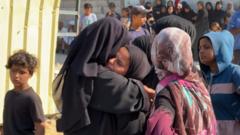While air drops may seem like a helpful gesture, they are deemed insufficient for resolving the dire situation in Gaza, where long-term solutions are necessary to combat starvation.**
The Limitations of Air Dropping Aid: A Desperate Measure in Gaza**

The Limitations of Air Dropping Aid: A Desperate Measure in Gaza**
Jeremy Bowen critiques Israel's proposal to air drop aid into Gaza, arguing that it fails to address the underlying hunger crisis.**
Israel's recent proposal to conduct air drops of aid into Gaza has sparked a significant debate among international observers and humanitarian workers, particularly due to the critical food shortages plaguing the region. This move appears to be an attempt to respond to growing criticisms from allies like Britain, France, and Germany, who have condemned Israel's policies regarding aid access and urged it to meet its obligations under international humanitarian law.
Despite Israel's insistence that it does not restrict aid trucks entering Gaza, this claim has been met with skepticism from closer allies and various humanitarian organizations actively working in the region. The urgency of calls for action against starvation has intensified recently, with officials pushing for immediate reform in the flow of humanitarian assistance.
Reflecting on past experiences, Bowen notes the impracticality and risks of air dropping aid, likening it to efforts seen in war-torn regions such as Iraqi Kurdistan and Bosnia. History reveals gruesome incidents where aid deliveries resulted in accidental harm to those they were meant to help. In Gaza, the method of air dropping supplies is particularly problematic; these airborne packages often scatter over inaccessibly dense urban areas and can cause chaos among desperate recipients.
Bowen argues that air drops are ultimately more symbolic than practical, presenting a visual representation of assistance rather than an effective solution to the ongoing humanitarian crisis. He emphasizes that true change requires a sustained ceasefire and effective ground-level aid operations, which are not currently being pursued. Desperate conditions remain for the vast number of displaced individuals in Gaza, many facing starvation, underscoring the need for comprehensive, accessible solutions more than mere emergency responses. The dire situation warrants a more profound commitment from the international community to ensure that aid reaches those in need safely and effectively.



















